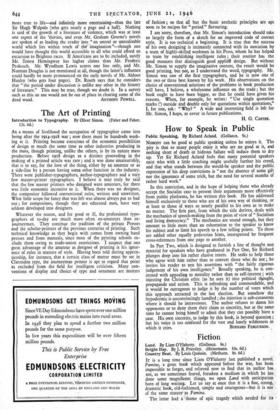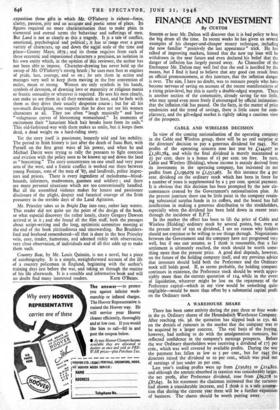Fiction
Land. By Liam O'Flaherty. (Gollancz. 9s.)
IT is a long time since Liam O'Flaherty last published a novel. Famine, a great book which appeared before the war, has been impossible to forget, and relieved now to find that its author has not, as we sometimes feared, forsaken a medium in which he has done some magnificent things, we open Land with anticipation born of long waiting, Let us say at once that it is a fine, strong, dramatic book, old-fashioned, simple and courageous—but it is not of the same stature as Fcnnine.
The latter had a • theme of epic tragedy which needed for its
,exposition those gifts in which. Mr. O'Flaherty is richest—force, clarity, passion, pity and an accurate and poetic sense of place. Its figures required no more characterisation than to make plain in elemental and eternal terms the behaviour and sufferings of men. But Land is not as clearly as this a tragedy. It s a tale of conflict, emotional, psychological and political ; it has to range over a great variety of characters, up and down the sncial scale of the time and place—County Mayo, 1879 ; and its theme requires from each of these eccentric and impassioned characters a precision, an isolation in his own entity which, in the opinion of this reviewer, the author has not been able to impose. Character-drawing has never held up the sweep of Mr. O'Flaherty's strong-brush ;'he uses men best as engines of pride, lust, courage, and so on ; he sets them in action and manages very well to keep them moving in the free convention of males, mean or strong. Women are only symbols in his hands, symbols of devotion, of dawning love or maternity or religious mania or frantic sensuality or whatever is required. He sees his men clearly, can make us see them in all their externals at least, and he feels with them as they drive their usually desperate course ; but for all his too-much description, one suspects that he does not see his women characters at all. They too often "laugh musically" and 'have " voluptuous curves of blossoming womanhood." In moments of excitement their ",luxuriant black hair breaks loose from its coils." This old-fashioned way with them makes us smile, but it keeps them dead, a dead weight on a hard-riding story.
Yet the story itself is passionate, honestly told and has nobility. The period in Irish history is just after the death of Isaac Butt, with Parnell on the first great wave of his power, and when he and Michael Davitt were trying to rally the peasants to fight coercion and eviction with the policy soon to be known up and down the land as " boycotting." The story concentrates on one small and very poor area of the west, and a frantic conflict is worked out there between young Fenians, sons of the men of '67, and landlords, police inspec- tors and priests. There is every ingredient of melodrama—blood- hounds, informers, madwomen, gunmen and soldiery; and there are many personal situations which are too conventionally handled. But all the assembled violence makes for honest and passionate disclosure of the plight, despair and fanatical courage of the Irish peasantry in the terrible days of the Land Agitation.
Mr. Priestley takes Ili in Bright Day into easy, rather -lazy waters. This reader did not quite see the point of the design of the book, or what especial discovery the rather lonely, chatty Gregory Dawson arrived at in it ; and she found all the film stuff, both the passages about script-writing and the long, optimistic committee meeting at the end of the book platitudinous, and unrewarding. But Brudders- ford and boyhood remembered—all that is done in the best Priestley vein, easy, tender, humorous, and adorned richly with observation, very close observation, of individuals and of all that adds up to make them such.
Country Beat, by Mr. Louis Quinain, is not a novel, but a piece of autobiography. It is a simple, straightforward account of the life of a country policeman. in England, beginning with the author's training days just before the war, and taking us through the routine of his life afterwards. It is a sensible and informative book and will no doubt find many interested readers. KATE O'BRLEN.



























 Previous page
Previous page